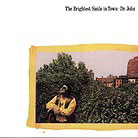February 2000
In the late '70s and early '80s, Dr. John made two critically acclaimed records -- just the man and his instrument, the magnificent grand piano. The subject of this review, The Brightest Smile In Town, has some high-end bloodlines that make it particularly worthy of release in the high-resolution 24/96 format that Classic Records has dubbed DAD. This album was recorded "using the Mark Levinson Audio System" at Orpheus Music in New York City. Mastering was performed by Bernie Grundman. The result is a recording that has great piano sound and great Dr. John vocal sound -- but the sound isn’t perfect. The piano tone is very well captured, but when Dr. John sings, as he does on perhaps 40% of the tracks, his vocals and the piano seem to have two different "acoustics" working. It sounds like he and the piano are in two different rooms. His vocals are also sometimes overpowered by the capabilities of the piano. I suspect that the microphones were placed close to the piano and less close to Dr. John. This gives the piano a more direct sound and Dr. John’s vocal a more distant and reverberant sound. The sound quality here is otherwise really fine, and the music, well, it’s simply great. This album quite possibly presents Dr. John at the height of his powers. The piano playing is confident, dynamic, complex, faultless and extraordinarily tasty. Dr. John’s vocals are what they have always been, not a beautiful pop or classical voice, but a voice that fits the man and the music to a "T." If he had a voice like Mel Tormé or Frank Sinatra, Dr. John may never have endeared himself to hundreds of thousands of fans. His raspy fonk-o-rama voice goes a long way to creating Mac Rebennack’s Dr. John persona. Of the songs presented on this album, only about a third involve the pen of Dr. John. The others are either traditional or written by popular and bluesy pre-1950s musical luminaries -- W.C. Handy among others. Compared to (US) commercial CDs and LPs of this album -- there is no comparison. The Classic Records DAD waxes the other versions I have. I would listen to this Classic Records 24/96 DAD disc over either the regular CD or LP any time, any day on any equipment. The difference is clearly audible on the stereo big rig as well as on a more modest A/V-receiver-based home-theater system, even when using synthesized surround-sound modes. On either system, the 24/96 DAD has a clear edge in transparency, clarity, speed, detail and spaciousness. The piano tone, should you happen to have a system that gets this right, will chill you to the marrow with the sense of rightness. There are no extra harmonics and no de-emphasized bass to make the mids seem "better." The upper bass has the right amount of percussion and harmonics to make it sound like a real piano rather than the processed-sounding, mushy upper bass we get from most popular major label recordings which have piano playing on them. There is no sense of "electronica," glare or grayness like the regular CD possesses. The point of reissuing worthy commercial albums is to present them in the best possible light given what was recorded on the master tapes. If this recording doesn’t sound exactly like the master tapes, it must be tantalizingly close, and the music is far and above what you get from mere audiophile recordings. I’d love to have perfect master tapes and first-class musical performances 100% of the time. But when that’s not possible, I prefer a little loss on the technical quality rather than having to accept a soulless but perfect-sounding performance. And that’s what we have here. The music is transcendent, and this is likely to be the best-sounding version of this recording that will come along for many years to come, perhaps ever. GO BACK TO: |
 Dr. John -
The Brightest Smile in Town
Dr. John -
The Brightest Smile in Town![[Reviewed on 24/96 DVD]](../format/2496dvd.gif) Dr.
John has been everywhere in the music world since the hippie days of the late '60s. All
along he’s been releasing records that somehow fit the times. A product of the
New Orleans school of music (lower case, not a physical school), Dr. John’s Patent
Medicine is made up of equal parts boogie-woogie, Mardi Gras, Cajun, Creole, rock
‘n’ roll, blues, and soul. One of his mentors was the stellar ivory tickler
Professor Longhair (Henry Roeland Byrd -- you really need to hear his Rock
‘n’ Roll Gumbo). You may know Dr. John for his acidic hippie hits from way
back when, or for his revitalization of standards on several recent albums, or for his
Mardi Gras party persona, or for his appearances on the records of more musicians and
singers than you can shake his signature cane at.
Dr.
John has been everywhere in the music world since the hippie days of the late '60s. All
along he’s been releasing records that somehow fit the times. A product of the
New Orleans school of music (lower case, not a physical school), Dr. John’s Patent
Medicine is made up of equal parts boogie-woogie, Mardi Gras, Cajun, Creole, rock
‘n’ roll, blues, and soul. One of his mentors was the stellar ivory tickler
Professor Longhair (Henry Roeland Byrd -- you really need to hear his Rock
‘n’ Roll Gumbo). You may know Dr. John for his acidic hippie hits from way
back when, or for his revitalization of standards on several recent albums, or for his
Mardi Gras party persona, or for his appearances on the records of more musicians and
singers than you can shake his signature cane at.